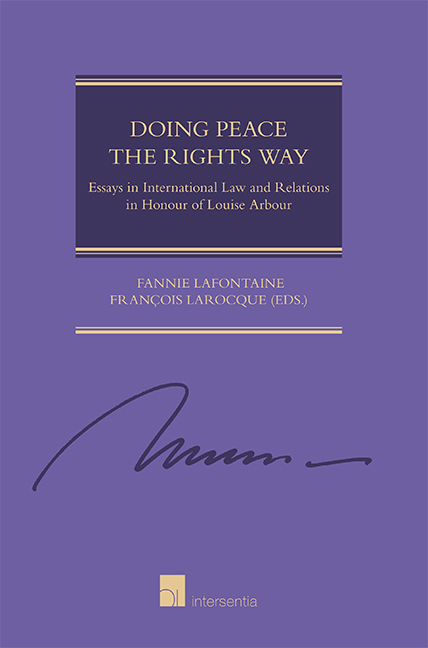Book contents
- Frontmatter
- Foreword
- Contents
- List of Contributors
- Introduction
- PART I OF FREEDOM AND EQUALITY
- PART II OF PEACE AND JUSTICE
- PART III OF WOMEN AND LEADERSHIP
- Leadership in the United Nations and the Challenge of Courage
- The World Bank as a Human Rights-Free Zone
- Come a Long Way and a Long Way to Go: UNSCR 1325 and Women's Participation in Peace-Making
- Why are Women Canada's Fastest-Growing Prison Population and Why Should We Care?
- Moving Beyond Facial Equality: Examining Canadian and French Niqab Bans
- Select Bibliography
- Appendix
- An Interview with the Honourable Madam Justice Louise Arbour
The World Bank as a Human Rights-Free Zone
from PART III - OF WOMEN AND LEADERSHIP
Published online by Cambridge University Press: 13 April 2019
- Frontmatter
- Foreword
- Contents
- List of Contributors
- Introduction
- PART I OF FREEDOM AND EQUALITY
- PART II OF PEACE AND JUSTICE
- PART III OF WOMEN AND LEADERSHIP
- Leadership in the United Nations and the Challenge of Courage
- The World Bank as a Human Rights-Free Zone
- Come a Long Way and a Long Way to Go: UNSCR 1325 and Women's Participation in Peace-Making
- Why are Women Canada's Fastest-Growing Prison Population and Why Should We Care?
- Moving Beyond Facial Equality: Examining Canadian and French Niqab Bans
- Select Bibliography
- Appendix
- An Interview with the Honourable Madam Justice Louise Arbour
Summary
This chapter addresses the question of whether the World Bank should engage with issues relating to human rights and, if so, why and how. Although such questions have long been matters of public controversy, they have never been satisfactorily resolved. In addition to the fact that there are strong reasons to revisit them now, they also carry a special resonance in looking back at the many contributions that Louise Arbour has made to the human rights cause in the course of her multifaceted and extraordinarily distinguished career. Whether as judge, chief prosecutor, High Commissioner or think-tank president, she distinguished herself by always thinking creatively and challenging established dogmas. She combined compelling logic and analytical skills with intellectual and political courage, along with a marvellous dry sense of humor. Of particular relevance to the topic I have selected for this chapter is the fact that, as United Nations (UN) High Commissioner for Human Rights, she was a tireless promoter of the need to integrate human rights considerations into mainstream activities in fields such as development, security and transitional justice.
THE WORLD BANK's KEY ROLE
No international development agency is more important than the World Bank in terms of its influence on overall development thinking, its shaping of policies to overcome poverty, and its ability to encourage or discourage governments and other key development actors to incorporate human rights considerations into their policies and programs. Some might question this characterization on the grounds that the $ 61 billion that the Bank provided in loans, grants, equity investments and guarantees to governments and businesses in the fiscal year 2016 represents only a fraction of the total private capital flows to developing countries from all multilateral and national development banks, bilateral donors and private investors. However, in addition to the funding dimension, its research is more voluminous and influential than that of its peers, it remains the key standard-setter in many areas, its knowledge and expertise are often crucial, and its seal of approval frequently encourages the participation of other donors or investors.
- Type
- Chapter
- Information
- Doing Peace the Rights WayEssays in International Law and Relations in Honour of Louise Arbour, pp. 375 - 400Publisher: IntersentiaPrint publication year: 2019



